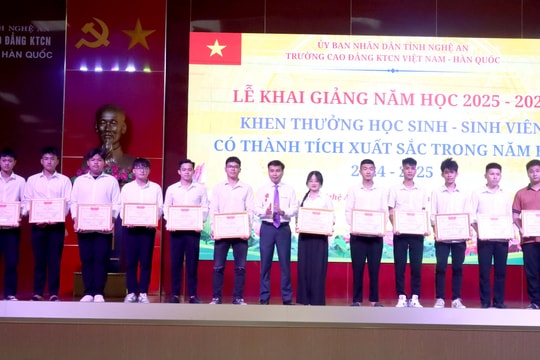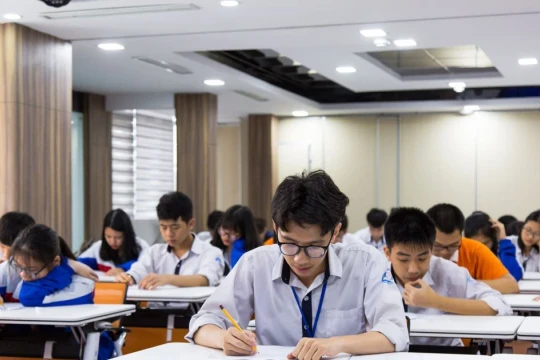Is university admission in 2016 by school group no longer feasible?
If university admissions are grouped, the flexibility of schools in allocating candidates to majors is more difficult to achieve.
The Ministry of Education and Training is preparing to issue guiding documents on centralized admission work to direct universities and colleges across the country to uniformly implement it.
According to Associate Professor Dr. Mai Van Trinh, Deputy Director of the Department of Testing and Educational Quality Assessment (Ministry of Education and Training), organizing centralized admission exams for universities will be a fundamental solution to the problems of 2015 and the problem of "virtual" candidates for schools.
Because the candidate's 4 wishes are considered simultaneously in the centralized admission process instead of 2 wishes being considered at each school, the candidate's chances of being admitted will be increased. On the other hand, this admission method ensures fair and transparent admission; ensuring the quality of admission based on the actual resources of the school.
Centralized admission is essentially admission for a larger group than the GX group (schools enrolling in groups). This method is more reasonable, equitable and effective than the previous method of separate admission for small groups and schools. Therefore, there is no need for small groups like GX and other groups anymore. All these groups will be merged into the same national “group”.
 |
| This year, the Ministry of Education and Training will organize centralized admission exams (illustrative photo) |
The flexibility of each school may be affected.
Previously, to overcome the situation of “virtual” candidates, in early April 2016, the Ministry of Education and Training proposed a solution for schools to be able to consider admissions in groups. As of the end of April 2016, 11 universities had registered for group admissions.
However, just one month later, the Ministry of Education and Training announced that it would conduct centralized admissions. So what are the shortcomings of group school admissions that made the Ministry change to centralized admissions?
National Economics University is one of the schools that registered to conduct group enrollment. Prof. Dr. Pham Quang Trung, Vice Principal of the school, said that the Law on University Education stipulates that enrollment is the responsibility of the schools, so whether or not to form groups is up to the schools to decide.
However, in group admissions, the flexibility of each university is likely to be reduced. If every year, when the exam results of candidates are available, the National Economics University has a plan to close the admission score according to the field of study. The number of candidates is allocated to the fields relatively harmoniously, avoiding the situation where some fields have too many candidates but some fields have no candidates.
As for this year, if students are recruited in groups, when universities finalize their recruitment orders, the data software will run, making it difficult for schools in the group to change the benchmark scores, allocate candidates in harmony with their exam scores, and allocate the number of candidates in different majors in the school appropriately.
Middle and lower class schools are difficult to implement.
The group admission regulations also note that candidates who have registered for admission to 2 or more schools in the group in the first round or 3 or more schools in the group in the additional admission round are not allowed to register for admission to schools outside the group.
However, according to some universities, the school group admission method can only reduce the number of virtual candidates in schools in a group but cannot completely solve this situation. For top schools, schools with large enrollment quotas, or schools with attractive training majors, joining a group can bring many benefits. But for middle and lower-ranked schools, if they do not carefully study the group's own admission regulations, it is very easy to have to compete to recruit students within the group.
In addition, when conducting group admissions, some schools may, for their own admissions benefit, not comply with the general regulations set forth by the group.
According to Prof. Dr. Tran Huu Nghi, Principal of Hai Phong Private University, universities and colleges that recruit students by group must agree and implement the general regulations set forth by the group. When University A recruits students for this major or combination, University B recruits students for another major or combination.
In the 2015 National High School Exam, the Ministry of Education and Training allowed candidates to register 4 wishes for 1 university and could withdraw or submit applications from one school to another, leading to "disorder" in university admissions and an increase in "fake" applications.
To overcome the above situation, this year, the Ministry of Education and Training has issued a new regulation allowing universities to consider admissions in groups. However, it is not certain that this solution can completely overcome the problem of "virtual" candidates.
Mr. Phan Huy Phu, Principal of Thang Long University, commented that in order to effectively select groups, universities and colleges need to have good, continuously updated, and transparent enrollment data management software. Through that, schools will also know the official data of candidates applying to the school and can also predict "virtual" candidates.
Changing from natural science to social science will be difficult.
Group admission only benefits candidates and helps universities and colleges predict and overcome "virtual" candidates when schools have the same major and similar admission scores.
The maximum difference in admission scores between schools is only 1 point. For example, the Ho Chi Minh City University of Technical Education and the Ho Chi Minh City University of Technology have 90% overlap in majors such as technology and engineering.
However, if candidates register for group admission, if they do not pass the engineering and technology major of a Natural Science University, it will be difficult to transfer to the blocks of the Social and Humanities University. That is the affirmation of Associate Professor, Dr. Do Van Dung, Principal of Ho Chi Minh City University of Technical Education.
In addition, we also need to think about the fact that some schools in the "middle" group think about the school's admission benefits and register to participate in the admission exam with the group of schools in the top group, which will affect the choice of majors and schools according to the candidates' preferences. For example, the Technology major of Ho Chi Minh City University of Technology has a standard score of 24 points, but there are candidates who only scored 23.75 points and did not pass the entrance exam to this school, but were also not considered for admission to a training school at the same level as Ho Chi Minh City University of Technology, but were pushed down to a lower-ranked school, which will be a disadvantage for them.
The shortcomings pointed out by universities have forced the Ministry of Education and Training to change to a centralized admissions system. This year is the first year the education and training sector has implemented this method of admissions, so it is impossible to predict what will happen.
Therefore, the Ministry of Education and Training needs to absorb all comments and suggestions from universities and candidates so that the 2016 university and college admissions can achieve the best results, avoiding waste and major impacts on society.
According to VOV







.jpg)
